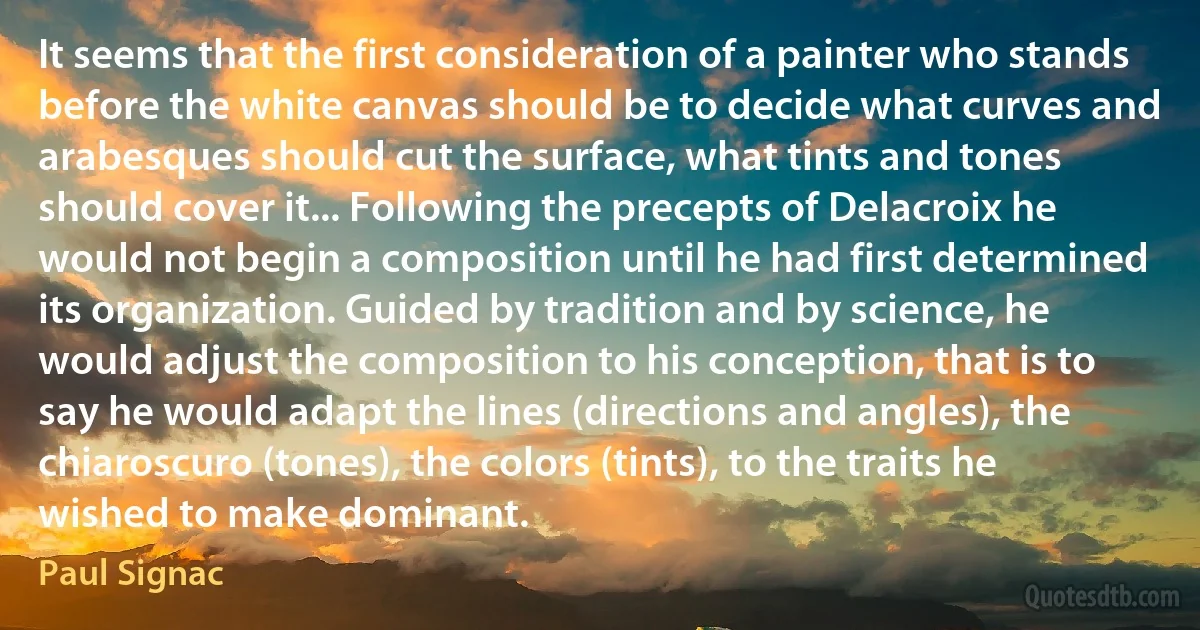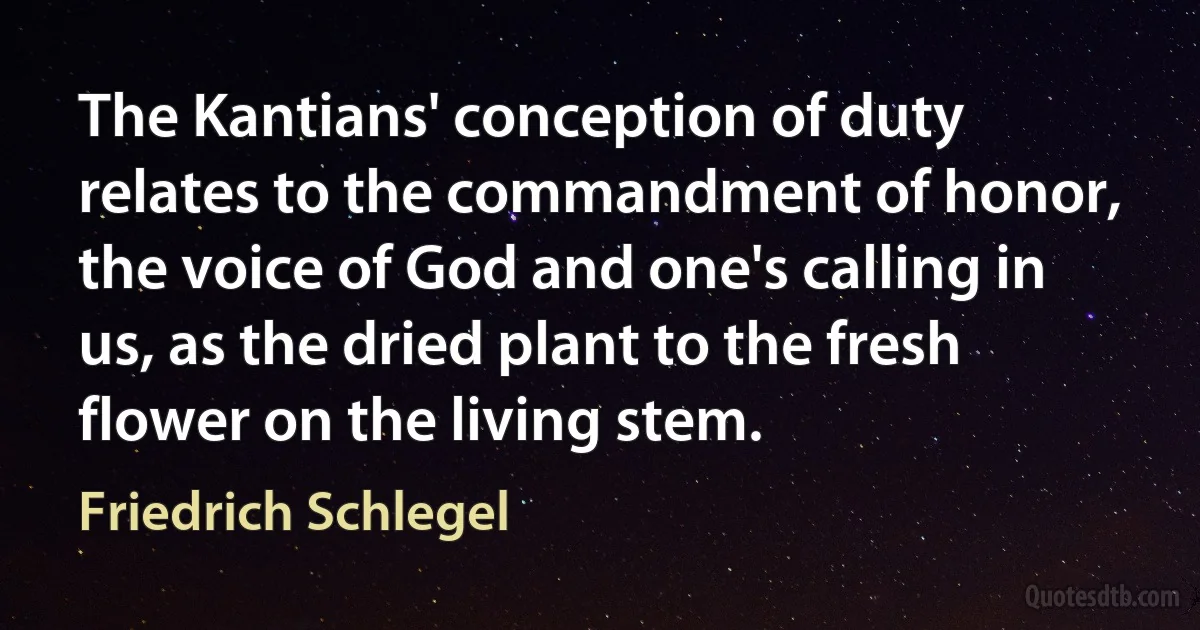Conception Quotes - page 6
The second conception of the world via the medium of matter required both a visual and a tactile perception of things. In this case the whole design process tends to emanate from the specific characteristics of the respective medium used. The leader of this movement (Tatlin) assumed.... that the intuitive and artistic mastery of materials would lead to inventions on the basis of which objects could be constructed. He believed he could prove this theory with his design for the 'Monument to the Third International' (1920), [never built]. He accomplished this task without having any special technical knowledge of construction.

El Lissitsky
We must take note of the fact that the artist nowadays is occupied with painting flags, posters, pots and pans textiles and things like that. What is referred to as 'artistic work' has on the vast majority of occasions nothing whatever to do with creative effort: and the term 'artistic work' is used in order to demonstrate the 'sacredness' of the work which the artist does at his easel. The conception of 'artistic work' presupposes a distinction between useful and useless work and as there are only a few artists buyers can be found even for their useless products. The artist's work lies beyond the boundaries of the useful and the useless.

El Lissitsky
At present we are living through an unusual period in time a new cosmic creation has become reality in the world, a creativity within ourselves which pervades our consciousness.... in this way the artist became the foundation on which progress in the reconstruction of life could advance beyond the frontiers of the all-seeing eye and the all-hearing ear. Thus a picture was no longer an anecdote nor a lyric poem nor a lecture on morality nor a feast for the eye but a sign and symbol of this new conception of the world which comes from within us.

El Lissitsky
Being, in whose name Heidegger's philosophy increasingly concentrates itself, is for him-as a pure self-presentation to passive consciousness-just as immediate, just as independent of the mediations of the subject as the facts and the sensory data are for the positivists. In both philosophical movements thinking becomes a necessary evil and is broadly discredited. Thinking loses its element of independence. The autonomy of reason vanishes: the part of reason that exceeds the subordinate reflection upon and adjustment to pre-given data. With it, however, goes the conception of freedom and, potentially, the self-determination of human society.

Theodor Adorno
Only then would the insistence on participation of the action art of FLUXUS and Happening be fulfilled; only then would democracy be fully realized. Only a conception of art revolutionized to this degree can turn into a politically productive force, coursing through each person, and shaping history.

Joseph Beuys
The most beautiful conception of immortality of which I know, and certainly one that by contrast shows the utter vulgarity of Christian ideas, is set forth in Pindar's second Olympian: after three or six lives in which a man has lived with strict justice and perfect integrity, he passes beyond the tower of Cronus to the fair realm that cannot be reached by land or sea, where gentle breezes from a placid ocean blow forever on the fields of asphodel. For a description, see Pindar. If the beauty of great poetry can commend a religion, here you have it.

Revilo P. Oliver
Air, fire, water and the earth evolve out of the spiritual and material staminibus in periodic cycles of time. Diverse connections of water, air, and light precede the emergence of the seed of the simplest plant, for instance moss. Many plants had to come into being, then die away before an animal emerged. Insects, birds, water animals, and night animals preceded the present animal forms; until finally the crown of earthly organization appeared-the human being, microcosm. He is the son of all the elements and beings, Nature's most carefully chosen conception and the blossom of creation. He must be the youngest child of Nature; many evolutions and revolutions must have preceded his formation.

Johann Gottfried Herder
It is most important that we should rid art of all that it has contained of ‘recognizable material' to date, all familiar subject matter, all traditional ideas, all popular symbols must be banished forthwith. More important still, we must hold enormous faith in ourselves; it is essential that the revelation we receive, the conception of an image which embraces a certain thing, which has no sense in itself, which has no subject, which means ‘absolutely nothing' from the logical point of view.... should speak so strongly in us, evoke such agony or joy, that we feel compelled to paint.

Giorgio de Chirico
The key to a Christian conception of studies is the realization that prayer consists of attention. It is the orientation of all the attention of which the soul is capable toward God. The quality of the attention counts for much in the quality of the prayer. Warmth of heart cannot make up for it.

Simone Weil
In my view-and that of most contemporary economists, I believe-Schumpeter's most original and most lastingly significant book was Theory of Economic Development, which appeared in 1911 (and was translated into English in 1934). It was at the University of Czernowitz, not far from the beginning of his career as an economist, that he worked out his conception of the entrepreneur, the maker of "new combinations,” as the driving force and characteristic figure of the fits-and-starts evolution of the capitalist economy. He was explicit that, while technological innovation was in the long run the most important function of the entrepreneur, organizational innovation in governance, finance, and management was comparable in significance.

Robert Solow
But I'm pro-life because I believe life begins at conception, and I believe that we should do everything possible to protect that life because it is the centerpiece of what makes us unique as an American people. We value the life of one as if it's the life of all, and that's why we go out for the 12-year-old Boy Scout in North Carolina when he's lost; that's why we look for the 13 miners in Sago, West Virginia, when the mine explodes; that's why we go looking for the hikers in Mount Hood, because we value life, and it's what separates us from the Islamic jihadists who are out to kill us. They celebrate death. They have a culture of death. Ours is a culture of life.

Mike Huckabee
The dualistic philosophy reigned supreme in Europe, dominating the development of Western science. But with the advent of atomic physics, findings based on demonstrable experiment were seen to negate the dualistic theory, and the trend of thought since then has been back to the monistic conception of the ancient Taoists.

Bruce Lee
Nothing is more delightful than to confuse and upset people. People one doesn't like. What's the use of giving them explanations that are merely food for curiosity? The truth is that people love nothing but themselves and their little possessions, their income, their dog. This state of affairs derives from a false conception of property. If one is poor in spirit, one possesses a sure and indomitable intelligence, a savage logic, a point of view that can not be shaken. Try to be empty and fill your brain cells with a petty happiness. Always destroy what you have in you. On random walks..

Tristan Tzara
[speaking about a Persian rug...] how modern their conception of space was! They understood it in the seventeenth century; we are only just beginning to re-understand it in the twentieth – see how they mesh the vines, the tendrils, the flowers with space and utilize these linked forms to create wholeness and radiance.

Arshile Gorky
A man full of warm, speculative benevolence may wish his society otherwise constituted than he finds it, but a good patriot and a true politician always considers how he shall make the most of the existing materials of his country. A disposition to preserve and an ability to improve, taken together, would be my standard of a statesman. Everything else is vulgar in the conception, perilous in the execution.

Edmund Burke
I always maintain that the great service that education renders to democracy is the same service that we hope to gain from religion. They work, or ought to work, hand in hand. It is to keep the moral weights and measures true to standard; and not only true to standard-true to the highest standard. And let us have that applied impartially to all classes of the community from the top to the bottom. There are those who would empty the conception of the state of all moral qualities, and they would confine education to a bread-and-butter business. If I may paraphrase Nurse Cavell's dying words, such patriotism is not enough. Moral standards, applied as I suggest, are the surest way to achieve that fundamental social unity which is postulated by democracy.

Stanley Baldwin
The conception of freedom in our country was one so precious, so hallowed, it has been obtained as the result of such age-long struggles, that I felt convinced that in no other country, whatever advantages in other respects they may have over us-in no other country was freedom treasured and regarded as it was in this country, and in its attainment there was no country in the world that had anything which in all circumstances it could teach us.

Stanley Baldwin



